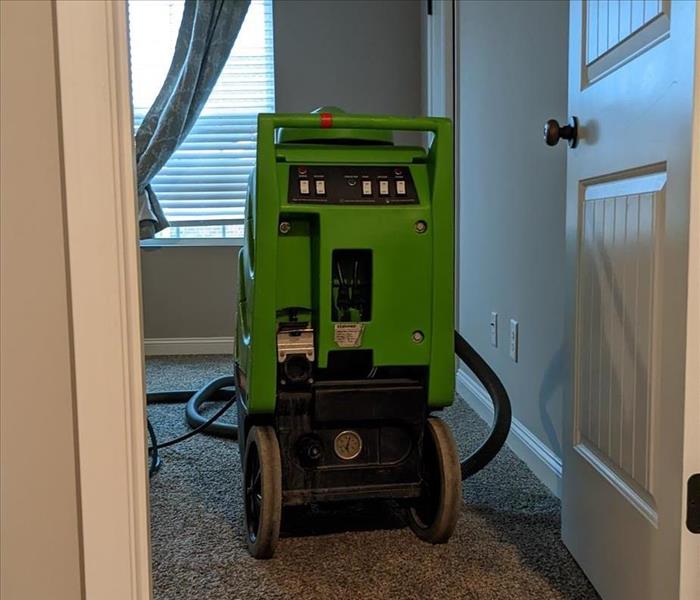Should You Consider Remodeling After Water Damage? Expert Insights for Homeowners
10/16/2024 (Permalink)
 We explore expert insights on what to consider before taking the next step and help you make an informed decision about remodeling.
We explore expert insights on what to consider before taking the next step and help you make an informed decision about remodeling.
Water damage can be one of the most distressing experiences for homeowners, with effects that range from minor inconveniences to significant structural problems. After dealing with the immediate aftermath, many are left wondering: Should I consider remodeling after water damage? In this blog, we’ll explore expert insights on what to consider before taking the next step, and help you make an informed decision about whether remodeling is the right choice for your home.
Understanding the Impact of Water Damage
Before diving into whether remodeling is the right choice, it's essential to understand the full impact of water damage on your home. Water can compromise the structural integrity of your property, damage electrical systems, and ruin materials like drywall, insulation, and flooring. According to the Insurance Information Institute, water damage and freezing issues make up nearly 28 percent of all homeowners' insurance claims in the U.S., making it a common and costly problem for many families source.
Key Considerations Before Remodeling
Remodeling after water damage isn't just about making your home look good again—it's about ensuring your property is safe, functional, and protected against future damage. Here are some crucial factors to consider:
1. Extent of the Damage
- Structural Integrity: Before any remodeling can begin, assess whether the water damage has impacted the structural components of your home, such as the foundation, beams, or load-bearing walls. If these areas have been compromised, immediate attention from a structural engineer or contractor is necessary.
- Hidden Damage: Water often seeps into areas that are not immediately visible, such as behind walls, under flooring, or in the insulation. Ensure that all hidden moisture is properly dried and inspected to prevent future issues like mold growth or rot.
2. Insurance Coverage
- Claim Scope: Review your insurance policy carefully to understand what’s covered and what isn’t. While some policies may cover the cost of repairs, they may not always cover upgrades or complete remodeling efforts. Discuss with your insurance adjuster what your options are before making decisions about remodeling.
- Documentation: Ensure that you’ve documented all the damage thoroughly with photos and detailed notes. This will be vital when communicating with your insurance provider and securing the funds necessary for both repairs and remodeling.
3. Cost vs. Value
- Budgeting: Remodeling can be costly, so it’s crucial to weigh the expenses against the potential value added to your home. Consider the cost of materials, labor, and any upgrades you wish to make. If the damage has led to outdated or damaged finishes, remodeling can not only restore your home but increase its market value.
- ROI (Return on Investment): Certain remodeling efforts, such as upgrading to more water-resistant materials, can have long-term benefits. For example, replacing damaged flooring with water-resistant vinyl or tile could prevent future damage and add resale value.
4. Future Prevention
- Upgrades for Safety: When remodeling, think about incorporating upgrades that will help prevent future water damage. This could include installing sump pumps, enhancing your home’s drainage system, or choosing waterproof materials for vulnerable areas like the basement or bathroom.
- Flood-Proofing: If your area is prone to flooding, consider adding flood-proofing measures such as raised electrical outlets, backflow prevention systems, or even elevating parts of your home. These improvements can save you from future headaches and additional repair costs.
The Benefits of Remodeling After Water Damage
Once you’ve considered the factors above, remodeling after water damage can offer several benefits:
- Restored Aesthetics: Remodeling allows you to update the appearance of your home, possibly improving on the previous design and making it more modern and functional.
- Increased Property Value: A well-done remodel not only repairs damage but can also add value to your home, especially if you choose high-quality materials and finishes.
- Enhanced Durability: By selecting water-resistant or waterproof materials, you can make your home more durable and resistant to future water-related incidents.
Final Thoughts: Is Remodeling Worth It?
Remodeling after water damage can be a significant investment, but it can also provide peace of mind, knowing that your home is safe and restored to its full potential. Before moving forward, make sure you thoroughly assess the damage, review your insurance coverage, and consult with professionals who specialize in water damage restoration and remodeling.
By taking these expert insights into account, you can make a well-informed decision that will not only restore your home but also protect it from future issues.


 24/7 Emergency Service
24/7 Emergency Service